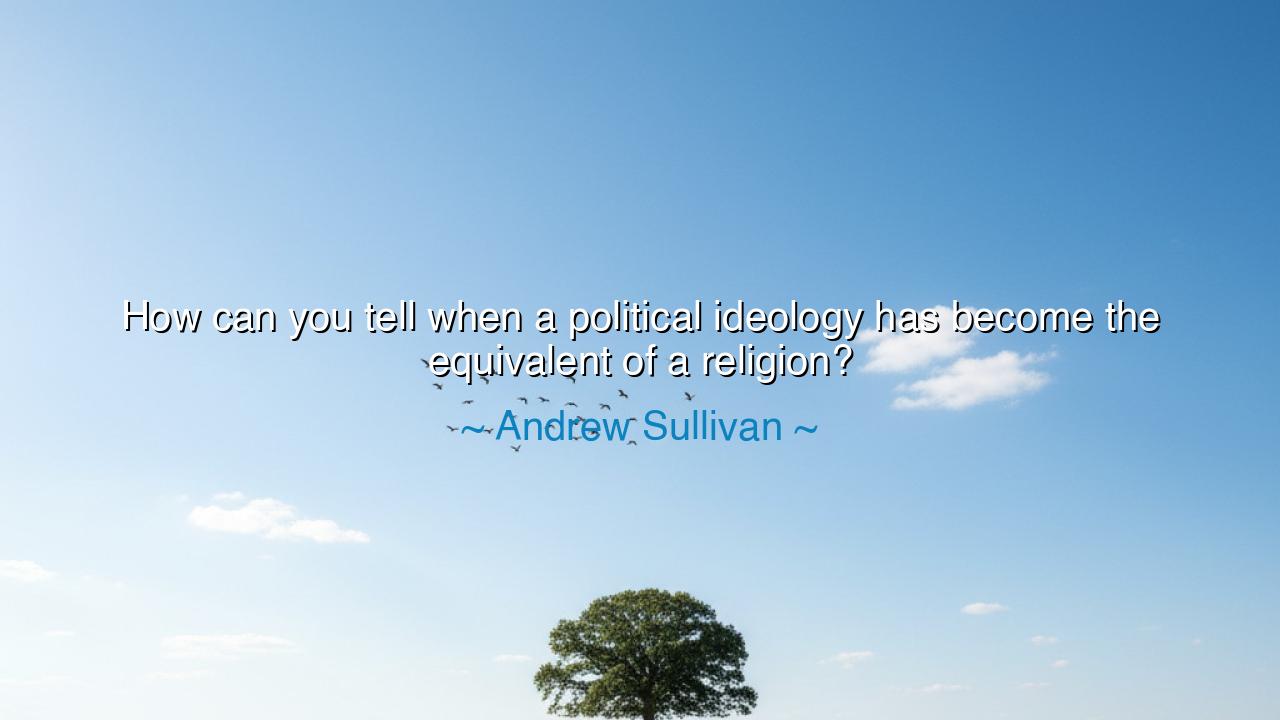
How can you tell when a political ideology has become the






“How can you tell when a political ideology has become the equivalent of a religion?” – Andrew Sullivan
In this piercing question, Andrew Sullivan, a thinker both of politics and of spirit, strikes at the heart of one of the great diseases of our age—the worship of ideology. His words are not a mere inquiry; they are a warning spoken with the gravity of prophecy. For when political ideology ceases to be a tool of reason and becomes an article of faith, the world forgets that truth is not a flag to be waved, but a light to be sought. Sullivan’s question echoes through the corridors of history, calling us to ask: when does conviction harden into dogma? When does belief, meant to serve mankind, begin instead to enslave it?
The origin of this thought lies in the eternal struggle between reason and zeal. Since the dawn of civilization, humans have sought meaning—through gods, through laws, through systems of thought. But when faith leaves the temple and takes the throne, it demands obedience in place of understanding. So too with politics: when ideas that were meant to guide the living become holy writ, they turn men into priests and heretics instead of citizens. Sullivan, observing the rising tides of fanaticism in modern discourse, saw how movements on both sides of the political divide began to resemble religions—complete with saints and sinners, rituals of purity, and doctrines beyond question.
The ancients knew the danger of such transformations. Plato warned that when passion overtakes reason, the city devours itself. In the French Revolution, we saw ideology enthroned as deity—the goddess of Reason raised in the cathedral of Notre Dame, the guillotine serving as her altar. Men once liberated from tyranny became tyrants themselves, convinced that their creed justified blood. So it has ever been: when political ideology becomes religion, dissent becomes blasphemy, and the cry for justice becomes indistinguishable from the cry for vengeance.
Consider the story of the 20th century—the rise of communism, fascism, and other totalizing creeds that promised heaven and delivered hell. Each began as a movement of hope, a vision for the betterment of humankind. But soon they demanded more than loyalty—they demanded worship. Statues replaced icons; leaders replaced gods; slogans replaced prayers. And millions died in the name of perfection. This is the very transformation Sullivan warns against: when the political becomes the sacred, and no question may be asked, humanity loses its soul in the fire of righteousness.
Yet his words are not only about governments and revolutions—they are about us. In the age of social media and moral polarization, the tribes of belief have returned. We no longer debate; we confess. We do not reason; we denounce. To question one’s side is to risk exile; to admit doubt is to invite condemnation. This is how you can tell that an ideology has become a religion—when it no longer welcomes inquiry but punishes it, when it demands faith instead of thought, when it measures virtue not by compassion but by conformity.
The lesson, dear listener, is as clear as it is difficult: guard your mind from the idolatry of certainty. Be devoted, but not blinded. Love your cause, but love truth more. Ideology, like fire, can warm or destroy—it depends on whether you hold it in your hand or let it consume you. The ancients called this balance sophrosyne, the temperance of the soul, where passion serves wisdom and conviction bows to humility. Without it, every good belief becomes a cruel god.
So live wisely. When you find yourself defending an idea as though it were divine, pause and breathe. Ask questions, even of your own convictions. Seek to understand before you seek to condemn. Remember that the gods of politics demand sacrifice, but the spirit of truth requires only honesty. For in the end, the world does not need more believers in ideology—it needs seekers of wisdom. Let your faith be in truth, not in faction; your loyalty be to conscience, not to creed. Only then will you walk the path of freedom, and keep your soul unshackled in the age of righteous certainty.






AAdministratorAdministrator
Welcome, honored guests. Please leave a comment, we will respond soon